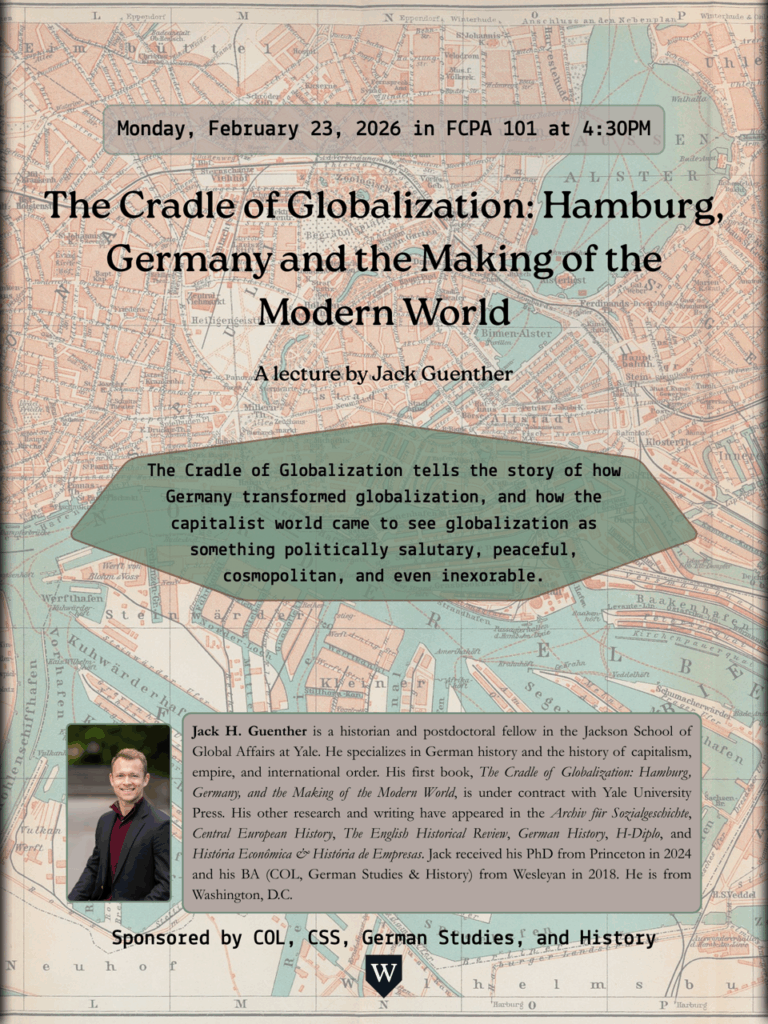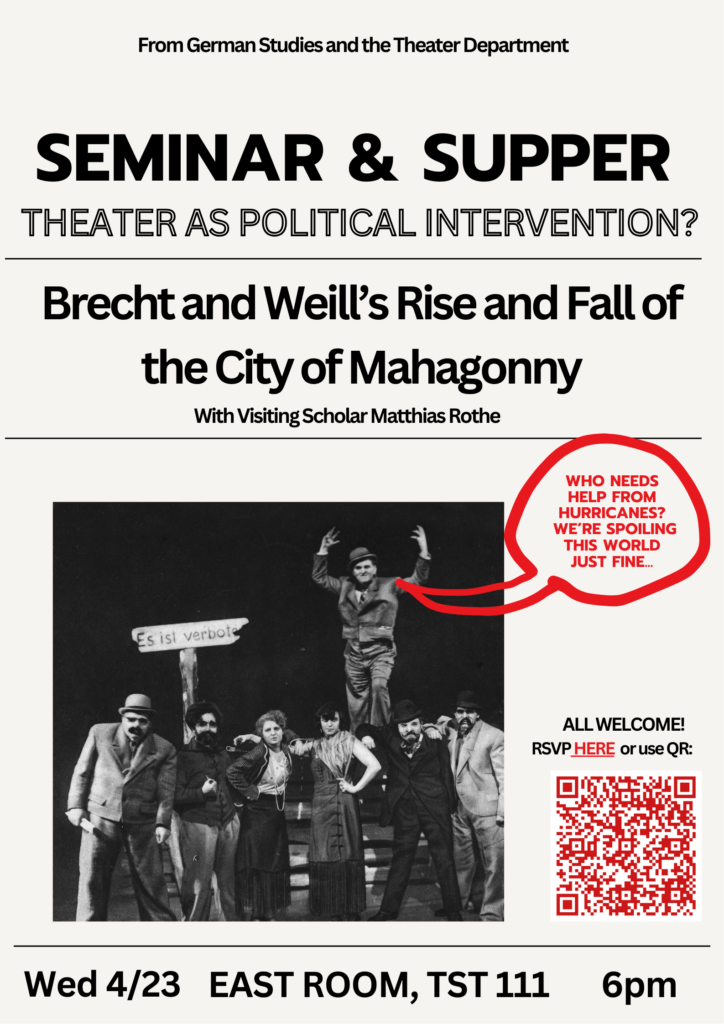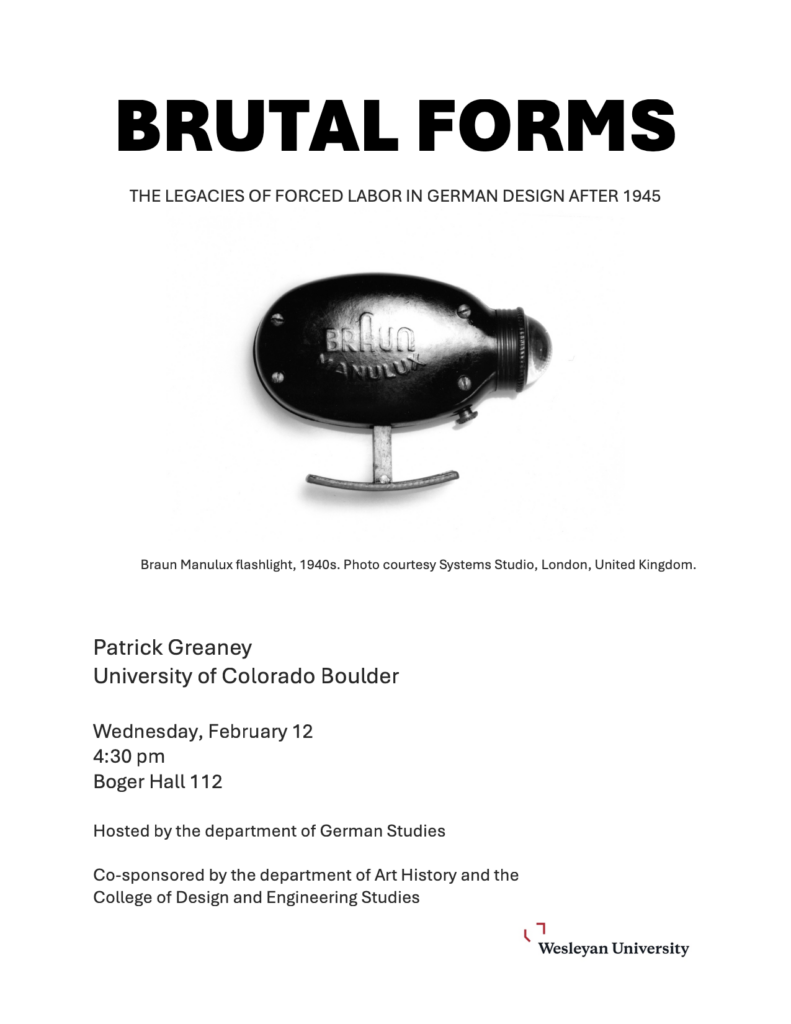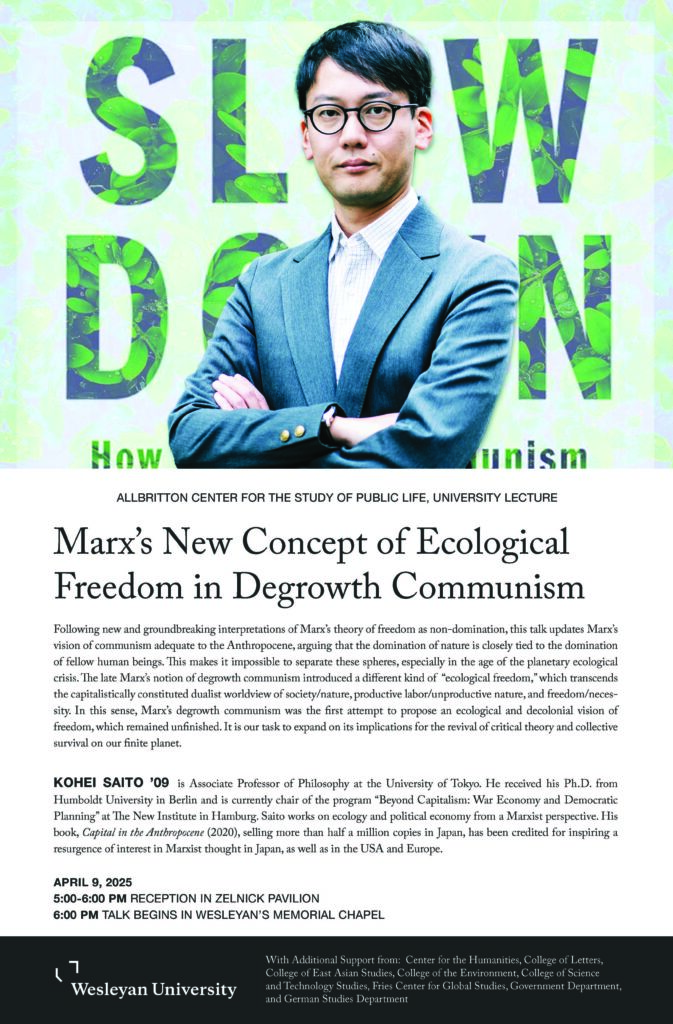
 German Department
German Department
Theater as Political Intervention? Seminar with Matthias Rothe (U Minnesota)

The premiere of Bertolt Brecht and Kurt Weill’s Rise and Fall of the City of Mahagonny in 1930 in Leipzig, Germany, at a time of heightened political tensions and National Socialism on the rise, turned into one of Germany’s biggest theater scandals. It was interrupted by brawls and outrage; it became the subject of discussion in parliament and had extensive nationwide press coverage. In a nutshell: A small group of left theater makers had successfully staged a political intervention. Which strategies and forms of collaboration did those involved – musicians, directors, stage designers, actors– pursue to make this happen? And most importantly, what did they want to make imaginable by their collaborative work on rehearsal and performance? What utopian potential did they seek to unlock? Matthias Rothe investigates these questions in his recent book Tropen des Kollektiven (Tropes of Collectivity). You are invited to join a seminar with him, exploring – with the example of Mahagonny – the power and limits of political theater at the end of the Weimar Republic and its lessons for today.
Matthias Rothe is Associate Professor of German Studies and Philosophy at the University of Minnesota, Twin Cities. He works on modern German literature, Avantgarde Theater, and Marxism, among other topics. Recent publications include: “Economic Psychos: Volker Braun’s Das ungezwungene Leben Kasts after Bret Easton Ellis”, in Text und Kritik 55 (2023); “‘Roundheads and Pointed Heads or the End of Avant-Garde”, in Brecht Yearbook 48 (2023); and his book Tropen des Kollektiven [Tropes of Collectivity], published by Theater der Zeit in 2024.
Click here for RSVP. The readings can be found here.
A Survivor’s Story

To RSVP, please use this link: https://docs.google.com/forms/d/e/1FAIpQLSfmL3kixs4SE4DlLqjySfWEAnRSL8XQsUql0Fa070qFj80TSw/viewform?usp=dialog
Lecture by Patrick Greaney

The German company Braun was founded in 1921 and became internationally prominent in the 1950s for its products designed in collaboration with Bauhaus alumni and the Ulm School of Design. Its radios, record players, and household appliances epitomized West Germany’s embrace of functionalism and quickly entered museum collections in Europe and the United States. This talk will examine the origins of Braun’s 1950s product designs in the National Socialist era and consider in particular the company’s indebtedness to forced labor.
Patrick Greaney is Professor of German and Humanities at University of Colorado Boulder. He is the author of Quotational Practices: Repeating the Future in Contemporary Art (2014) and Untimely Beggar: Poverty and Power from Baudelaire to Benjamin (2008). He has edited or co-edited six books, including An Austrian Avant-Garde (2020)and Conceptualism and Other Fictions: The Collected Writings of Eduardo Costa, 1965-2015 (2016), and his most recent literary translations and co-translations are Heimrad Bäcker’s Documentary Poetry (2024) and Carlos Soto Román’s 11 (2023)
Jason Kavett ’09 translates Paul Celan’s letters to Gisèle Celan-Lestrange
Jason Kavett ’09 has translated the correspondence between the poet Paul Celan and his wife, the artist Gisèle Celan-Lestrange. His translation appears in the New York Review Books Poets imprint:
“Letters to Gisèle presents the letters Celan wrote to his wife, the French visual artist Gisèle Celan-Lestrange, over the course of close to twenty years, along with letters to the couple’s son, Eric, and letters from Gisèle to Paul. They provide an intimate view of his literary career and troubled life, which was marked by repeated stays in psychiatric clinics. They also provide an unparalleled glimpse into Celan’s poetic workshop, including his own word-for-word renderings from German into French of more than a dozen of his poems. These he addressed to Gisèle as an ongoing, informal German lesson. They figure too as messages from the heart. Presented here trilingually, these overlapping versions of Celan’s poems open up new dimensions of his famously hermetic poetry, as dazzling as it is dark.“

Jason’s translation has been reviewed in the New York Times and the Chicago Review of Books.
Wensinger and Lensing on Enzensberger
In memory of poet and essayist Hans Magnus Enzensberger, who recently passed away at the age of 93, retired German Studies professors Jerry Wensinger and Leo Lensing published commemorative articles in the “Geisteswissenschaften” section of the Frankfurter Allgemeine Zeitung on February 15, 2023. For historical background, Enzensberger had been offered a yearlong fellowship at Wesleyan’s Institute for Advanced Studies (now the Center for the Humanities), but in January 1968 resigned after only a semester to move to Cuba “to work there for a substantial period of time,” as he explained in his resignation letter to Wesleyan president Etherington. On campus, he had been disturbed by the quiescent attitude towards the militarism of the Johnson administration, an attitude he found reflected in how people talked about US politics: “a new crop of words has been banished, by common consent, from polite society: words like “exploitation” and “imperialism.” They have acquired a touch of obscenity. Political scientists have taken to paraphrases and circumlocution which sound like the neurotic euphemisms of the Victorians. Some sociologists have gone so far as to deny the very existence of a ruling class. Obviously, it is easier to abolish the word “exploitation” than the thing it designates; but then, to do away with the term is not to do away with the problem.”
Cherry Blossoms – A German movie with English subtitles
The Middletown International Film Festival presents Cherry Blossoms – Kirschblüten – Hanami by Doris Dörrie, with an introduction by Associate Professor Iris Bork-Goldfield.
Doris Dörrie’s bittersweet film beautifully juxtaposes German and Japanese culture and tells the story of mourning and the futility of trying to recover something lost.
The screening will be at 7:00 p.m., on Thursday, October 13, 2011, at Wesleyan University’s Center for Film Studies
Admission is free







